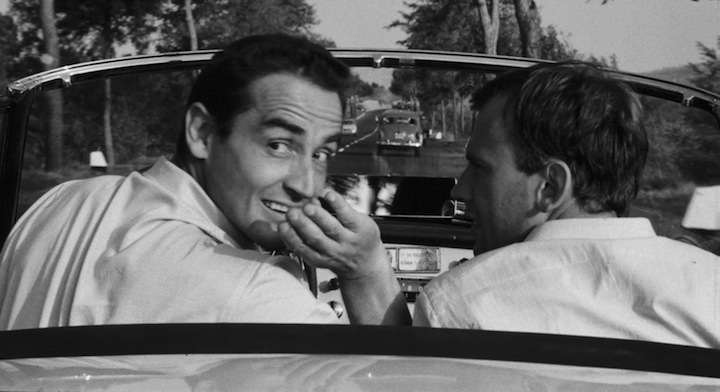If you happen to have missed some of the masterpieces of Commedia all’italiana style, and you live in New York City, you are given a whole month to catch up. From December 14 through January 16, 2017, MoMA hosts a major retrospective on Dino Risi’s work.
Preceded by a cocktail reception held at Gattopardo Restaurant, the retrospective officially kicked off on Wednesday, December 14, with the New York premiere of iconic masterpiece Il sorpasso, The Easy Life (1962), as screened in a brand new 4k restoration, courtesy of Luce Cinecittà, Cineteca di Bologna, Surf Film, and Janus Films.
The retrospective features newly struck 35mm prints of 14 other movies by the Milanese writer-director, including Poveri ma belli (Poor, But Handsome, 1957), Il vedovo (The Widower, 1959), and Profumo di donna (Scent of a Woman, 1974), by premiering recently rediscovered documentaries Risi literally drew out from the ashes of World War II — Neorealist portraits of Lombardic and Neapolitan street life and culture between 1946 and 1950. Also included are such less known gems as Il mattatore (Love and Larceny, 1960), La marcia su Roma (March on Rome, 1962), Il giovedì (The Thursday, 1966), and In nome del popolo italiano (In the Name of the Italian People, 1971).
MoMA Director, Glenn Lowry, and Camilla Cormanni, Head of Luce Cinecittà International Cultural Promotion, were delighted to introduce The Easy Life and the whole retrospective, which is the fortunate effort of joined forces between Luce Cinecittà, Roma, and the Museum of Modern Art — through Joshua Siegel, Curator of Department of Film. Before the movie started, Cormanni took care of emphasizing the tremendous, unaltered value of The Easy Life, the movie that grasps the grounding duality of the Italian man at the time of the economic Boom — arrogant and puffed-up on the one hand, totally shy and anxious on the other.

A classic of 1960s Italian cinema, the film stars the never-do-well Bruno Cortona, aka Vittorio Gassman, and cautious, well-mannered Roberto, played by Jean-Louis Trintignant, as they blaze in a Lancia Aurelia Spider from Rome to Tuscany, during a tour-de-force night of improbable/memorable encounters and funny stopovers by respective families. Vittorio Gassman thrives in his role as the impossible-yet-irresistible scoundrel, and Jean-Louis Trintignant supports him stupendously in the shoes of the uptight goody-goody law student. Their fleeting companionship, which blooms and dies in just one night, is a canny narrative device to suggest the massive economic growth Italy was experiencing in those years, where everything seemed possible, within one’s reach — easy, as the English title suggests — yet could in the end bring about dramatic implications. The end never stops shocking generations of viewers, who would never expect that such a sweet, happy-go-lucky comedy could turn, in a sheer blink of an eye, into the bleakest tragedy. Mechanic extension of Bruno’s cocky ways as well symbol of machismo and bullying, the car, which eventually tumbles down the cliff and dooms Roberto — the innocent, the victim, the duped — to his fate, puts an abrupt end to the carefree ride, and metaphorically, to the easy life Italy was indulging into.
That’s the soul of commedia all’italiana, the bitter-sweet comedy rife with irony by Dino Risi, and by other major colleagues of his, like Mario Monicelli, Luigi Comencini, Ettore Scola. He caricatured politicians, playboys, priests and good-for-nothings, and made fun of them, while making fun of the people watching them… His movies are microcosms of shameless rogues played by some of the era’s greatest actors — Alberto Sordi, Vittorio Gassman, Nino Manfredi and Ugo Tognazzi, to name a few.

The retrospective comes along with a first-rate bilingual publication, Dino Risi. Pensieri, parole, immagini / Thoughts, Words, Images, edited by Steve Della Casa and published by EdizioniSabinae. Organized in chronological order, thick with Risi’s quotations, anecdotes, and behind-the-scenes, the illustrated book walks us through the film-director’s life and movies, while starting with a touching preface by Marco Risi, his son. Speaking about Risi’s inclination to tragedy, Marco confirms how his father was actually more attracted to drama than comedy: among all the films shot by Billy Wilder’s, for instance, his favorite happened to be Sunset Boulevard — definitely not a comedy…











